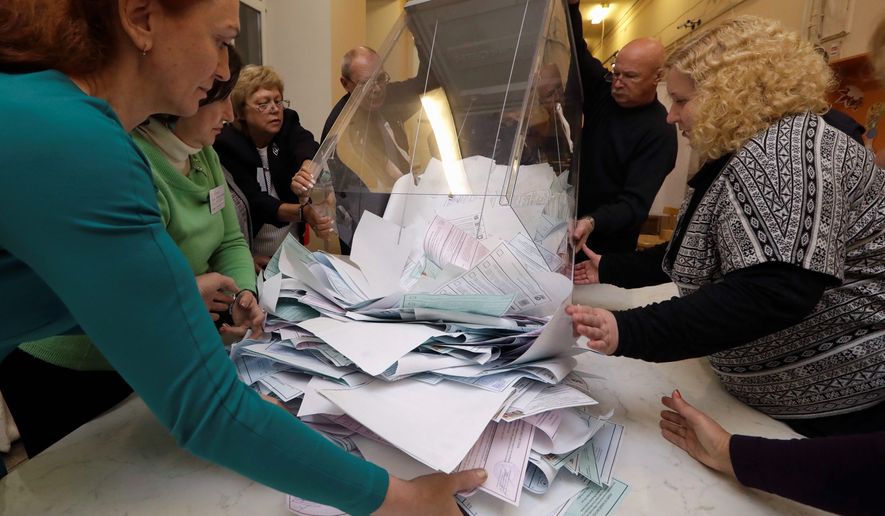MOSCOW — The ruling United Russia party was leading in early results Sunday in national elections, poised to retain control of parliament despite a deep economic recession and Russia’s worst relations with the West since the Cold War.
With more than 10 percent of the ballots counted, United Russia was recording 46 percent of the vote for party-list seats and was running far ahead in single-district contests. Few surprises were expected in the carefully managed elections, with President Vladimir Putin’s ruling United Russia party predicted to easily maintain its majority in parliament despite a slump in popularity.
Widespread voter apathy and disillusionment meant embarrassingly low turnouts in major cities. In Moscow, the capital, the turnout was just 28 percent by 6 p.m. local time, the lowest turnout this century. In St. Petersburg, Russia’s second city, it was even lower at 25 percent. Nationwide, the turnout was 40 percent, election officials said.
“It’s clear that Russians have stopped believing that elections can change anything,” Mikhail Kasyanov, leader of the opposition Parnas party, told the Interfax news agency.
Wary of a repeat of the mass demonstrations sparked by widespread vote-rigging in the previous parliamentary elections, the Kremlin made a number of concessions to the opposition. Independent candidates, including some openly financed by Mikhail Khodorkovsky, an exiled oil tycoon and bitter Kremlin critic, were allowed to stand for the first time since 2003.
The authorities also replaced the country’s unpopular election chief, Vladimir Churov, whose oft-repeated slogan was “Putin is always right,” with Ella Pamfilova, a former head of the Kremlin’s human rights council.
Despite the shake-up, there were widespread accusations of voting violations, with reports of ballot-stuffing and the mass busing-in of government employees to vote for United Russia. In one video, from southern Russia’s Dagestan region, a web camera caught a woman slipping dozens of votes into a ballot box. Ms. Pamfilova has promised to investigate all complaints.
Before polling stations opened, Mr. Putin and Prime Minister Dmitry Medvedev publicly appealed to Russians to vote. Mr. Medvedev, who heads United Russia’s party list, said the vote was taking place at a “difficult” time for the country, which he said was under “heavy pressure from outside forces.”
Russians interviewed by The Washington Times were unmoved. “I haven’t even given the elections a moment’s thought, to be honest,” said Natasha Titova, a housewife walking past a polling station.
The national elections were the first since the Kremlin annexed Crimea from Ukraine in March 2014, sparking scenes of joyous celebration in Russia and a rise in nationalist sentiment. They are widely seen as a dry run for the 2018 presidential elections, when Mr. Putin could secure a fourth term in office that would keep him in power until 2024.
Although Mr. Putin remains broadly popular among Russian voters, United Russia’s approval ratings have declined sharply amid economic woes triggered by Western sanctions and low global prices for oil.
About 23 million Russians — 16 percent of the population — are living beneath a poverty line defined as an income of $174 a month, according to government statistics. This month, the Russian Finance Ministry said the national reserve fund, designed to cover gaps in the budget, has shrunk by two-thirds, from $90 billion to just over $32 billion, since 2014.
A pre-election opinion poll carried out by the independent Levada Center indicated that United Russia’s nationwide approval ratings fell from 39 percent to 31 percent in August alone. Russian authorities responded by clamping down on the pollster, labeling it a “foreign agent.”
“This is an act by a repressive regime,” said the Levada Center’s director, Lev Gudkov. “It is clear that this was politically motivated.”
In an indication of the deep cynicism surrounding the elections, a separate nationwide poll by the Levada Center found that one in four Russians would be willing to sell their vote — the majority for $76 or lower.
Frequent accusations of corruption have also contributed to United Russia’s problems. Two days before the elections, Alexei Navalny, the opposition figurehead, accused Mr. Medvedev of secretly owning a lavish countryside estate worth an estimated $450 million. Mr. Medvedev has denied the accusations. This month, Ilya Yashin, an opposition activist, published a report detailing documented links between United Russia and organized crime.
Although 14 parties were on the ballot paper, only two — Parnas and Yabloko — are consistently critical of the Kremlin. Neither was expected to overcome the 5 percent threshold needed to enter parliament. Mr. Navalny’s Progress Party was barred from the polls, and he and his supporters slammed the elections as illegitimate.
Voting also took place in Crimea, where opponents of Russian rule said local officials had been ordered to ensure a high turnout and at least 60 percent of the vote for United Russia. Ukraine’s parliament urged countries not to send election observers to the annexed territory. In Kiev, the Ukrainian capital, clashes erupted between Ukrainian nationalists and Russians attempting to vote at their country’s embassy.




Please read our comment policy before commenting.